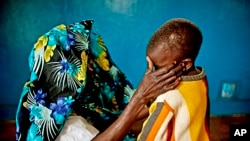A new study has found that a form of psychological treatment, called group cognitive therapy, helps ease and reverse the emotional symptoms of victims of rape in war-torn countries where highly-trained psychologists are few and far between. The good news, say researchers, is that community-based counselors can be trained to provide the service with good results.
Since 2000, the United Nations Security Council has passed nine resolutions denouncing rape during times of war as a human rights abuse.
Women, who are victims of rape in war-torn countries, face a series of short and long-term health and psychological problems including depression, anxiety and post-traumatic stress disorder, according to Judith Bass, a professor of mental health at the Johns Hopkins School of Public Health in Baltimore, Maryland.
Bass says rape, which has become a global problem, also affects whole communities where sexual abuse victims live.
“This problem of rape and violence against women is not only about the act of violence but it’s also becoming, unfortunately, wider spread as it is being used in the arsenal of warring factions to dehumanize and humiliate populations," said Bass.
Bass says women who are raped often suffer from stigma in their communities, fear of returning to the site of the offense and concern whether they can meet the needs of their families. Sudden sounds or events can trigger memories of the rape.
In the Democratic Republic of the Congo (DRC), where civil war has raged for more than more than three decades since the country’s independence from Belgium, Bass and colleagues investigated whether cognitive behavioral group therapy, which has been shown to be effective in wealthier Western countries, could help women overcome their fears and depression.
The study involved 157 women over the age of 18 who participated in therapy groups and 248 rape victims in villages who were treated one-on-one by sympathetic counselors who actively listened to the women’s fears.
After six months, 42 percent of those in individual counseling who were depressed at the outset of the therapy no longer showed signs of depression. But in the cognitive behavior groups in which women discussed goals and learned specific skills for overcoming their depression and symptoms of post-traumatic stress disorder, 70 percent of women were no longer considered depressed.
Bass says the good news is that rape victims living in villages with few highly-trained psychologists could be successfully treated by counselors with good listening skills who had received comparatively little training.
“They could do it right and they didn’t need to have high levels of education, and the services didn’t need to have clinicians available," she said.
...except to provide training and check in with the therapists from time to time. Bass says she’s looking forward to seeing how well the strategy for training low-level counselors works with rape victims in other war-torn countries.
An article on cognitive therapy for victims of rape is published in the New England Journal of Medicine.
Since 2000, the United Nations Security Council has passed nine resolutions denouncing rape during times of war as a human rights abuse.
Women, who are victims of rape in war-torn countries, face a series of short and long-term health and psychological problems including depression, anxiety and post-traumatic stress disorder, according to Judith Bass, a professor of mental health at the Johns Hopkins School of Public Health in Baltimore, Maryland.
Bass says rape, which has become a global problem, also affects whole communities where sexual abuse victims live.
“This problem of rape and violence against women is not only about the act of violence but it’s also becoming, unfortunately, wider spread as it is being used in the arsenal of warring factions to dehumanize and humiliate populations," said Bass.
Bass says women who are raped often suffer from stigma in their communities, fear of returning to the site of the offense and concern whether they can meet the needs of their families. Sudden sounds or events can trigger memories of the rape.
In the Democratic Republic of the Congo (DRC), where civil war has raged for more than more than three decades since the country’s independence from Belgium, Bass and colleagues investigated whether cognitive behavioral group therapy, which has been shown to be effective in wealthier Western countries, could help women overcome their fears and depression.
The study involved 157 women over the age of 18 who participated in therapy groups and 248 rape victims in villages who were treated one-on-one by sympathetic counselors who actively listened to the women’s fears.
After six months, 42 percent of those in individual counseling who were depressed at the outset of the therapy no longer showed signs of depression. But in the cognitive behavior groups in which women discussed goals and learned specific skills for overcoming their depression and symptoms of post-traumatic stress disorder, 70 percent of women were no longer considered depressed.
Bass says the good news is that rape victims living in villages with few highly-trained psychologists could be successfully treated by counselors with good listening skills who had received comparatively little training.
“They could do it right and they didn’t need to have high levels of education, and the services didn’t need to have clinicians available," she said.
...except to provide training and check in with the therapists from time to time. Bass says she’s looking forward to seeing how well the strategy for training low-level counselors works with rape victims in other war-torn countries.
An article on cognitive therapy for victims of rape is published in the New England Journal of Medicine.




